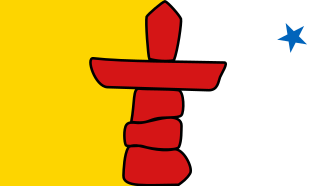Nunavut Day facts for kids
Quick facts for kids Nunavut Day |
|
|---|---|
 |
|
| Observed by | Nunavut, Canada |
| Date | July 9 |
| Frequency | annual |
Nunavut Day (Inuktitut: ᓄᓇᕗᑦ ᐅᓪᓗᖓ) is a special public holiday in Nunavut, a large territory in northern Canada. It is a day when many people in Nunavut do not work or go to school.
Contents
Nunavut Day celebrates a very important event in the history of Nunavut. On July 9, 1993, the Parliament of Canada passed a law called the Nunavut Act. The Parliament is the group of people who make laws for Canada.
This law was passed after people in the Northwest Territories voted in 1982 to divide their large territory. The Nunavut Act officially created the new territory of Nunavut.
Even though the law was passed in 1993, Nunavut officially became its own territory later. On April 1, 1999, Nunavut legally separated from the Northwest Territories. This was a huge step for the people living there.
The first Nunavut Day was celebrated on April 1, 2000. However, people soon felt that another date was more important.
Moving the Holiday Date
The date for Nunavut Day was changed to July 9. This date was chosen because it marks when the Nunavut Land Claims Agreement was signed in 1993. This agreement was a very important deal between the Inuit people and the Canadian government. It gave the Inuit more control over their land and resources.
A Special Day for the Territory
Nunavut Day is a public holiday in Nunavut. This means that many businesses and schools close for the day. However, some stores and organizations still stay open.
People who work for the federal government of Canada still have to work on this day. But people who work for the Nunavut territorial government get the day off.
Fun Activities and Events
Many fun cultural activities and events happen across Nunavut on this day. Communities often organize special gatherings.
Some common celebrations include:
- Community breakfasts where everyone can eat together.
- Traditional dancing and games.
- Competitions about Nunavut's history.
- Speeches from local leaders.
- New announcements from the Government of Nunavut.
Traditional food is often served at these events. For example, in 2010, the city of Iqaluit had a barbecue with burgers made from muskox meat.
 | Lonnie Johnson |
 | Granville Woods |
 | Lewis Howard Latimer |
 | James West |

